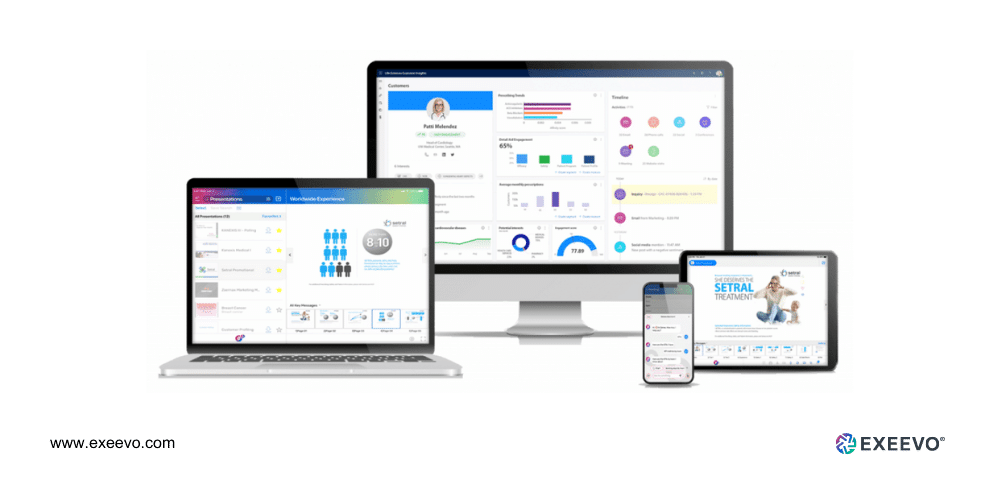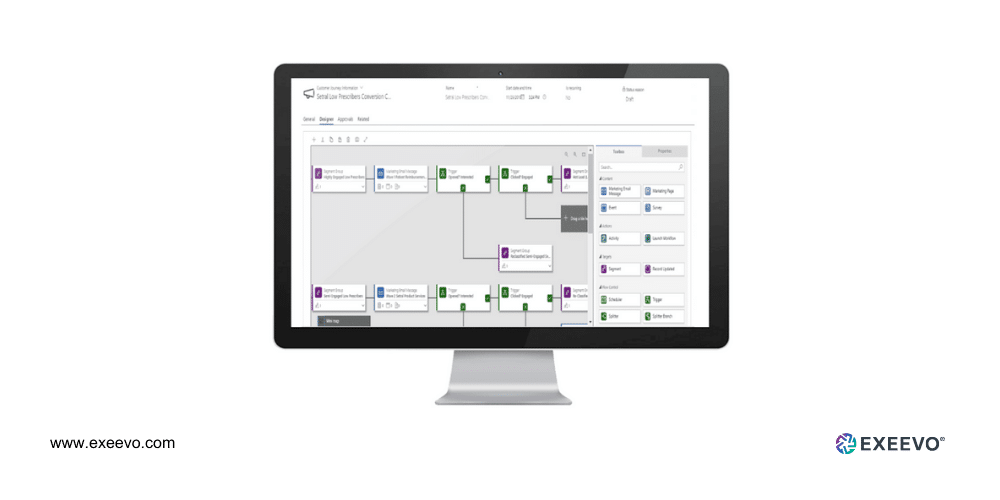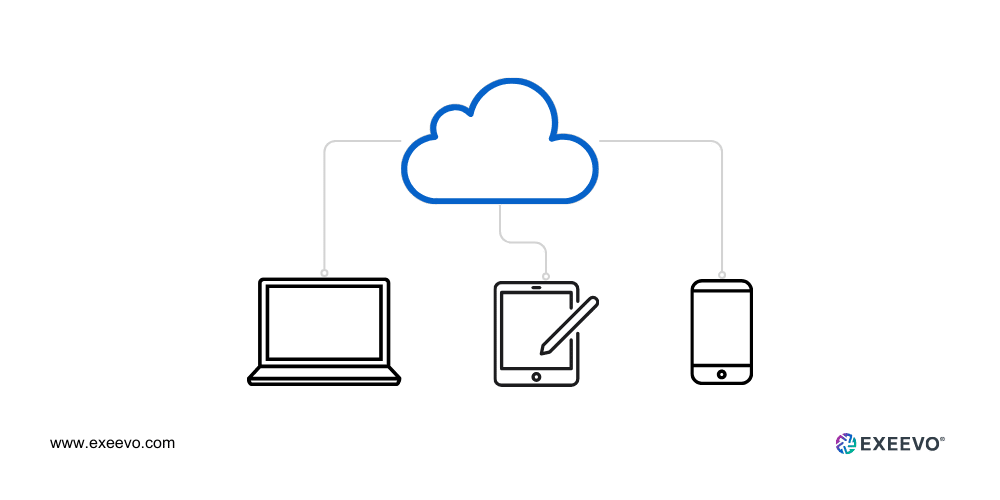The global Pharma and biotech CRM software market is expected to grow to $10.83 billion by 2027, and for good reason. Achieving optimal results in the pharmaceutical industry hinges on implementing proficient CRM solutions.
These solutions unify diverse strands of information into a complete view of customer interactions while encouraging quality relationships, fostering customer retention, and boosting commercial growth.
Recognized by Gartner, IDC and Everest as the only alternative to Salesforce-based systems, Exeevo is a specialized pharma CRM solution that prioritizes a 360-degree view of all customer transactions. Device agnostic and built on the power of Microsoft Dynamics 365 and 365 Copilot, Omnipresence CRM brings multiple business applications together in a unified system, coupled with advanced analytics to reveal insights, drive wiser decisions, and unleash new opportunities for commercial growth.
With this backdrop, we’ll discuss the five benefits of Pharma CRM solutions. As we explore each, you’ll gain an understanding of how a well-implemented CRM solution, like Exeevo, can transform organizational efficiencies and customer engagement.
What is Pharma CRM?
A CRM, short for Customer Relationship Management solution, is a platform that manages customer interactions and data throughout the customer lifecycle to:
- Enhance business relationships
- Foster customer retention
- Encourage commercial growth
A Pharma CRM is fine-tuned for the pharmaceutical industry’s specific needs.
Pharmaceutical entities engage with stakeholders like doctors, pharmacies, and hospitals. That’s when integrating a CRM comes in as a potent solution. These solutions:
- Records intricate details about each stakeholder
- Aid the formulation of personalized strategies and communications
- Nurture better relationships and yield improved outcomes
Integration with various functionalities like automation, marketing, and digital analytics is a significant facet of pharma CRMs. It empowers organizations with insights derived from customer data analysis. This facilitates optimized marketing strategies that are more focused and result-driven.
Additionally, Pharma CRM incorporates tools for performance management. This feature helps delineate benchmarks and monitor commercial teams. It encourages a proficient allocation of resources and boosts profitability.
5 Key Benefits of Pharma CRM
Implementing Pharma CRM solutions streamlines pharmaceutical companies’ operations and marketing strategies. Key to this transformation are the benefits that Pharma CRM brings to the table.
Given the complexities and varied stakeholder interactions in the pharma sector, it’s essential to have precise CRM solutions. They address unique needs that result in better business relationships and customer retention.
A notable advantage of CRM solutions is their compatibility with various tech stacks. This integration provides a unified toolset that improves functionality and the user experience.
There are many other benefits. To understand this better, let’s now shed light on the five key benefits of Pharma CRM.
1. Process Automation
Business Process Automation (BPA) is a strategy that aims to streamline business processes, reduce errors, and minimize costs. It forms a foundation for enhancing the efficiency of CRM solutions.
Automation sets the stage for a series of tasks that bring uniformity and precision to the operations of pharmaceutical companies. At the foundational level, process automation encompasses a variety of tasks, such as:
- Appointment scheduling
- Follow-up reminders
- Order processing
Process automation reduces manual labor time. A report indicates that 60% of jobs could see more than 30% of their fundamental tasks automated.
Stepping up the capabilities of CRM solutions is the integration of Generative AI. This technology creates personalized commercial campaigns that resonate with clients. Generative AI extends its utility as a predictive tool. It can analyze past interactions and data trends to predict potential client needs.
The introduction of automation in Pharma CRM steers businesses towards a more streamlined and proactive approach. It represents the next wave of customization and efficiency in the pharmaceutical sector.
2. Centralized Database

The healthcare CRM market was worth $14.3 billion in 2021 and is expected to grow at a CAGR of 8.4% from 2022 to 2030. The rising need for structured data and automation in healthcare organizations is fuelling this growth.
A centralized solution eliminates the challenges associated with disparate data pools. It brings coherence and a single source of truth that empowers companies to manage customer information.
Handling customer data without a centralized repository can bring about a host of challenges:
- Inconsistencies that lead to data redundancies
- Impairment in the decision-making process
- There are bottlenecks in accessing crucial data that hinder operational efficiency
A centralized database emerges as a unifying solution. It promises easy access to information at all times. A centralized database ensures improved data accuracy and reduces the possibility of errors.
Beyond this, it nurtures enhanced collaboration, wherein teams can work together. It enables teams to have all the requisite data at their fingertips, which drives projects to successful fruition with a unified vision. The transition from fragmented solutions to centralized ones marks a transformative stride toward efficiency and collaboration.
3. Customer Segmentation

Customer segmentation promotes a detailed understanding of various customer groups. Implementing segmentation strategies enables companies to be 60% more attuned to the challenges and concerns of their customers. It increases the likelihood of discerning customer intentions by 130%.
A Pharma CRM analyzes key parameters like medical history, prescription patterns, and demographics. It helps companies categorize customers into distinct segments.
Detailed segmentation lays the groundwork for marketing efforts that resonate with each group. You can address the unique needs and preferences of each segment. Moreover, it helps you develop personalized communication strategies to make each interaction more meaningful and potent.
Beyond marketing, customer segmentation facilitates superior resource allocation. Firms can prioritize resources based on different segments’ specific requirements and potential.
A customer segmentation strategy combines personalization with smart resource use. It leads the pharma industry toward a future of wise choices and strong strategies.
4. Customer Journey Tracker
Organizations can track and analyze the complex pathways of the customer journey by utilizing a Pharma CRM solution. These solutions offer a detailed view of every touchpoint a customer interacts with, from first contact to ongoing engagements.
An essential advantage of this tracking is its deep insight into customer behavior. Analyzing this wealth of data allows companies to discern the preferences and habits of their clientele. As a result, they can develop more targeted and personalized strategies that resonate well with customers.
Pharma CRM empowers organizations to refine each customer interaction point for improved service delivery. The solution helps recognize and resolve issues. It promotes smooth business operations and builds strong, lasting relationships with clients.
Using the customer journey tracker in Pharma CRM gives firms a significant advantage. It helps them design strategies based on a deep understanding of their customers. It paves the way for a richer and more rewarding business-client relationship.
5. Data Mobility

Data mobility means moving data from one place to another with ease. It’s a critical attribute of modern Pharma CRM solutions.
The global pharmaceutical marketplace presents inherent challenges. Most significant is accessing a goldmine of global data and insights on the move.
Data mobility solves these issues. This feature leverages real-time insights and updates without restriction to a fixed location. It helps relevant stakeholders make informed decisions. A device-agnostic mobile solution mitigates the issues associated with fixed or location-bound data access points and ensures that geographical constraints do not hinder teams.
CRM solutions address this through mobile apps, cloud-based access, and remote connectivity.
- They guarantee unbroken access to valuable data
- They guarantee uninterrupted access to valuable data
- They ensure a smooth flow of information, which allows field teams to operate at their best
With the latest data available, these platforms can enhance efficiency and productivity.
5 Reasons Why Your Pharma Company Needs a New CRM Solution
A contemporary CRM solution is a pillar of efficiency and strategic foresight for pharma companies. Transitioning to a new CRM solution could mean:
- Unlocking enhanced data mobility
- Leveraging artificial intelligence for personalized campaigns
- Boosting process automation
- Facilitating regulatory compliance
- Moving towards a future of sustained growth and heightened productivity
Now is the time to consider the competitive edge a modern CRM solution can offer your pharma business.
1. CRM Solutions are Becoming Too Costly

The pharmaceutical sector already struggles with the complexities of a highly regulated market. It’s under added pressure due to outdated CRM solutions and high costs. Such solutions often need help managing the vast amounts of customer data and insights essential for the industry.
These days, the complex dynamics of the industry-customer relationship make it necessary to have a streamlined CRM. Older solutions lead to inefficiencies as they escalate maintenance costs and resource drains. They place an undue financial burden on pharma companies.
Exeevo’s Omnipresence, with its single-license framework, offers a lifeline in this scenario. Unlike multiple license structures that can be inefficient and costly, Exeevo’s single license framework simplifies the process. Clients no longer need to navigate the hassles, financial implications, and time sinks associated with renegotiations and new agreements.
An example is the termination of the Veeva-Salesforce partnership. It highlights the benefits of a more straightforward CRM licensing model.
2. Commercial and Marketing Efforts are Inefficient
Inefficient legacy CRM solutions in the pharma sector create hurdles to growth. Issues arise from data silos where crucial information becomes inaccessible to those who need it. This creates communication gaps, resulting in missed opportunities as teams aren’t working from a unified, real-time data set. It can hamper quick and informed decision-making.
The recent breakup between Veeva Solutions and Salesforce has created a scenario filled with uncertainties. Life Sciences CIOs face potential service disruptions as they deal with unforeseen changes in their CRM processes without clear guidance from the involved parties.
Modern solutions like Exeevo’s CRM offer hope. It is designed for agility and provides native Microsoft Teams integration for enhanced collaboration and efficiency. This integration yields a unified user experience by streamlining data management for global teams.
Reducing manual data entry can minimize errors and ensure compliance with regulatory standards. With low/no-code tools, it’s adaptable to meet unique needs and keep your business current with technological advancements.
3. Your Client Support is Weakening

Patients, HCPs and stakeholders rely on timely, accurate information in the Life Sciences sector. They expect swift responses to queries and a seamless communication experience. Robust customer support can:
- Build trust,
- Create loyalty
- Ensure that patients and providers get the information they need when needed
A business’s reputation suffers when there’s a gap between expectations and delivery. There’s a ripple effect where outdated CRM affects current contracts or commercial efforts, and future potential partnerships or client relationships could struggle.
Exeevo’s Omnipresence CRM strengthens client support for stronger customer relationships. Our intelligent assistant, Genee, assists teams in administrative tasks. It includes scheduling and recording meetings and retrieving vital customer details, even while on the move.
Moreover, Genee employs artificial intelligence to track KPIs for field teams. It provides insights on actionable steps to enhance the customer experience. With Exeevo’s CRM solution, pharma businesses can rectify weakened client support and transform it into a robust and proactive entity for satisfied customers.
4. Decision-Making Seems Like Guesswork

Due to the inadequacies of legacy CRM tools, decision-making often seems like guesswork. These outdated solutions can obstruct the analysis of crucial data. They can hinder the achievement of strategic objectives and the making of informed decisions. Without the robust support of data-driven tools, businesses struggle with inefficiencies and cannot meet customer needs.
These inadequate CRM solutions can stifle access to critical data and present significant challenges, such as:
- Fragmented data views
- A lack of real-time insights
- Poor integration
These challenges can be costly, as the Life Sciences industry requires precision. Data-driven insights offer a roadmap and guide businesses towards:
- More accurate forecasting
- Better understanding of market trends
- Informed strategic planning
Exeevo’s market automation capabilities stand tall with its remarkable capacity to leverage data-driven insights. Our CRM enables AI-driven personalized customer experiences and facilitates an automated customer journey.
Exeevo CRM centralizes the effort, bringing Medical Affairs, Sales, and Marketing under one roof for real-time sharing of critical data and insights. It focuses on consent and compliance while engaging healthcare professionals.
5. Integrating Third-Party Tools Becomes a Hassle
Integrating third-party tools into outdated CRM solutions often creates a maze of complexity. Pharma businesses must work with time-consuming setups, high costs, and steep learning curves for employees. Adaptability and innovation get restricted as teams juggle between disconnected tools.
There’s the added financial burden of managing these disjointed solutions, not to mention the strain it puts on your personnel, juggling various platforms that need to communicate better.
Exeevo’s CRM promotes limitless tech stack integrations, and teaming up with Microsoft Teams has freed pharma businesses from the limitations of the past.
It offers a hub for streamlined communication and real-time global data access for informed decisions. Exeevo promises a customizable, secure, and compliant solution with a harmonious work environment and enhanced device capabilities.
The Future of Pharma CRM
The future of Pharma CRM holds promising advancements and transformative possibilities. As technology evolves and the industry grows, the demand for advanced CRM solutions will continue to rise. Tomorrow’s solutions promise seamless data integration, strengthened customer bonds, and analytics. As pharma becomes more digitally intertwined, selecting the right CRM is critical.
If you seek a CRM solution that stands out in the pharma sector, Exeevo’s Omnipresence CRM is the only solution you need. It provides:
- Seamless integration: No more data silos. Centralize all your data for easy access
- Enhanced customer interactions: Cultivate stronger relationships through smarter insights
- Real-time analytics: Make data-driven decisions on the go
Don’t just take our word for it! Get in touch to discuss Omnipresence’s benefits or request a live demo. For more insights and to stay updated with industry trends, explore more on the Exeevo blog page. Make your next CRM decision the best one!
